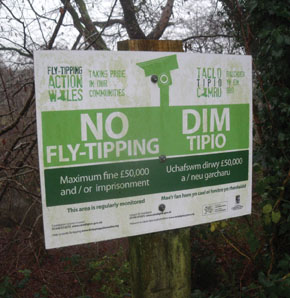Fly-tipping incidents dealt with by councils in England topped one million last year. The total of 1,072,000 was an increase of 8pc from the 998,000 reported in 2017-18.
Nearly two thirds (62pc) of fly-tips involved household waste. Total incidents involving household waste increased by 2pc from 2017/18. As in previous years, the most common place for fly-tipping to occur was on highways, pavements and roads, which accounted for near half (46pc) of incidents in 2018-19. The number of highway incidents has increased by 6pc from 2017/18.
As in the last few years, the most common size category for fly-tipping incidents in 2018-19 was equivalent to a ‘small van load’, one third of total incidents. Nearly as common was the equivalent of a ‘car boot or less’ (30pc). The number of fixed penalty notices issued by councils has continued to increase, up 11pc to 76,000 in 2018-19. In May 2016 local authorities in England were given the power to issue fixed penalty notices for small scale fly-tipping. And since January, local authorities and the Environment can issue fixed penalty notices for breaches of householder duty of care, where householders give their waste to fly-tippers.
For the stats, covering England only for April 2018 to March 2019, visit the Defra website. Incidents involving the Environment Agency or cleared by private landowners are not included.
Comment
David Renard, Environment spokesman for the Local Government Association, said: “Fly-tipping is illegal, a serious public health risk, and costs taxpayers in England more than £57 million a year to clear up. This is why councils take the issue very seriously and took action on nearly half a million incidents in 2018/19 – around 5,000 more than the previous year and up by nearly 75,000 in six years.
“Councils are determined to crack down on the problem, including installing CCTV at fly-tipping hotspots which has led to successful prosecutions. However, prosecuting fly-tippers often requires time-consuming and laborious investigations, with a high threshold of proof.
“The next government needs to ensure councils have the funding needed to investigate incidents and should review sentencing guidelines for fly-tipping, so that fly-tippers are given bigger fines for more serious offences to help deter incidents. Manufacturers can also contribute, by providing more take-back services so people can hand in old furniture and mattresses when they buy new ones. We’d urge our residents to report fly-tipping as soon as possible.”
Picture by Mark Rowe; council anti-fly-tipping sign in Welsh and English near Aberystwyth.
More in the December 2019 print issue of Professional Security magazine.









